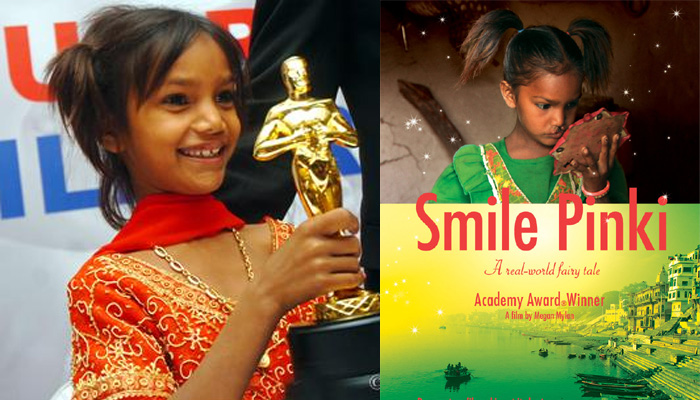‘Smile Pinki’ fame girl, now 20, struggles with poverty after 2009 Oscar win
It is a smile that’s been splashed across India’s newspapers for days on end — and not once, but twice, the first time in 2009, and the second in 2013. And both occasions were newsworthy: the first was the Oscar awards ceremony; the second, the men’s Wimbledon final.
In 2009, the Oscars were all about India, and not just because of Slumdog Millionaire, which won the Best Picture that year; the winner in the documentary (short) category was Smile Pinki, Megan Mylan’s feature on the young lady in front of this reporter. She was six years old at the time, and a special guest, along with her father, at the award ceremony.
Four years later, Pinki Sonkar, then 10, was a smiling presence between Novak Djokovic and Andy Murray (Murray won, the first male Briton do so since 1936) on Centre Court for the toss.
Pinki was born with a cleft lip or a cleft palate, a condition that affects tens of thousands of children born in India every year. In these babies, the lips or the palate (the roof of the mouth) do not join together during their development in the womb. The cleft causes social ostracism. But Pinki was lucky. She was the recipient of free corrective cleft lip surgery by Varanasi-based plastic surgeon Subodh Kumar Singh, who is associated with Smile Train India (part of Smile Train, a charity that works exclusively in the area of cleft lips and palates). Smile Pinki was her story (and the story of the charity itself). It took her to Los Angeles, and then, four years later, to London.
“I don’t remember much. What I can recall though is that I was honoured by the Smile Train team and the documentary film director. She thanked me. I was given a trophy. I treasure it very much. This trophy is a symbol of the fact that we went to America and participated in the Oscar award ceremony. Wahan bohot bade bade log maujud the (Many prominent people were present there). The ceremony was very grand,” she adds. Her father Rajendra Sonkar and Dr Singh accompanied her.
She smiles wistfully recalling the memories. The magic of the trips to London and Los Angeles did not last. Now 20, and a Class 12 student, Pinki is still a resident of the same village, and she and her family aren’t really concerned abut their past encounter with fame – because they have the more pressing task of managing their daily encounter with poverty. Sonkar was a fruit and vegetable seller then, and he remains one now. The family (now grown to six) was poor then, and remains poor now.
Pinki and her family have to walk over 100 metres to a well to fetch water daily. Even the school where she is enrolled, SRVS Inter College in Ahiraura, is 9km from her village.
“My father has to work very hard to fulfil our basic needs. He has very little land. Selling seasonal fruits and vegetables is his only source of income,” Pinki says. “See, the condition of my house. We have just two small rooms, one without a door.”
Sonkar adds: “After returning from America, life became the same again. I restarted selling seasonal fruits to meet expenses of my family. ”
Pinki acknowledges she couldn’t have continued her education without support from Mamta Carroll, Smile Train’s senior vice-president and regional director for Asia.
“Mamta Madam helped me a lot. She loves me very much. Her affection and assistance are my strength. Every month, Madam sends money so that I can continue my studies,” Pinki says.
“Madam says she will continue to help me as long as I study.”
But the family received no other help.
Sitting next to Pinki, her uncle Lalchandra Sonkar says, “Gareeb ki parwah kise hai (who cares for the poor).”
The family didn’t get a house under the Awas Yojana (housing scheme) as names of her father and uncle were missing from the list prepared for providing pucca houses to those lacking one, according to Rampur Dhabahi’s village head Kunj Vihari Singh. “I am trying my best to get the name of Pinki’s father and uncle listed,” he added. And he says that he will talk to senior block officials to make drinking water arrangements at Pinki’s house.
“Smile Pinki took our village’s name international. We are proud of her,” headman Singh said.
That fame came after documentary film maker Megan Mylan found out that the GS Memorial Hospital, where Dr Singh works, a centre supported by Smile Train, had completed tens of thousands of surgeries to correct cleft lips. As she set out to make a feature, Mylan encountered Pinki and her father.
“When I first met Pinki, she was a shy, unsure, thin girl, all of six years old from a small village of traditional weavers and farmers in Mirzapur. Pinki underwent her cleft surgery followed by speech training and other treatment at GS Memorial Hospital, supported by Smile Trian. She gradually settled into the normalcy of life: regular school, ease of eating, speaking, and for the first time, smiling. Pinki is today full of beans, a bright, confident young girl. A Class 12 student , she aspires to join the police and serve the nation,” says Mamta Carroll.
Pinki says that when she becomes a police officer she will work for the benefit of girls who live in villages such as hers.
“The day will come when I will beat poverty and emerge victorious,” she says.
And then she smiles.

